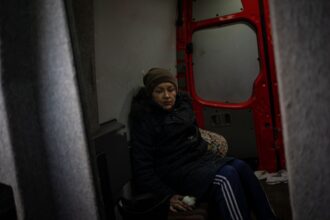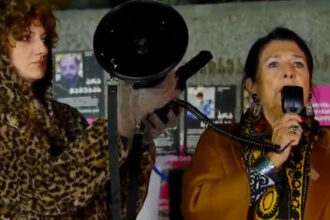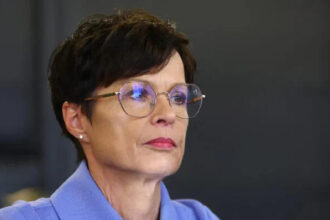The German Bundestag passed a resolution on October 10 that was presented by the ruling coalition (SPD/Alliance 90/The Greens and FDP), which supported Georgia’s EU vision and civil society but also harshly criticized GD. The resolution “A European Future for Georgia”, focuses on the country’s democratic backsliding, and the anti-democratic measures taken by the current GD Government. It also calls for the German Federal Government take concrete actions in response.
The resolution, which is aimed at the EU, calls for the suspension of EU accession as long as the anti-LGBTQ+ laws and the controversial “Transparency of Foreign Influence”, as it’s called, are in effect.
The Foreign Affairs Committee was asked to discuss the motion of the AfD parliamentary group, which opposes “regime-change policy in Georgia”.
In the lively debates, the German government was urged to ensure that the future development in relations with Georgia is dependent on fair and free parliamentary elections. The Georgian leadership was also urged to stop the unlawful persecution by police and prosecutors of peaceful demonstrators. The debates also included voices that were critical of the resolution, and called for “not to interfere in Georgia’s domestic affairs”, particularly by the far-right AfD party.
Here you can read about the political dynamics in the German Bundestag as well as some of the views that were expressed during the Bundestag debate of October 10.
The German BUNDESTAG
Since 2021, Germany has been governed by a coalition known as the “traffic-light” coalition. This coalition is made up of the Social Democratic Party, the Green Party and the Free Democratic Party. The largest number of members in the Bundestag are from their parliamentary groups, or “Fraktionen”. The Union parties (CDU/CSU) are the main opposition parties, followed by the far right and right-wing populist Alternative for Germany (AfD).
Two parties, Die Linke (left) and Bundnis sahra Wagenknecht(BSW), do not have a faction status, but are organized into a “group” because they do meet the minimum number required to form a group. The so-called “groups”, however, have fewer privileges and rights within the Bundestag.
What you should know about AFD
The Alternative for Germany is a German far-right party. It was the opposition to the governing coalition’s resolution on Georgia. The AfD and the BSW are both described as Russia’s closest friends in Germany. Both parties blame NATO and the US for the war in Ukraine. The AfD wants to end German military aid for Ukraine. Some of its politicians are suspected of having ties to Russia. The party was founded in 2013 and initially focused on opposing eurozone bailouts as well as fiscal policy of the European Union. Over time, the party shifted to the right. It now mainly supports anti immigration policies.
In this year’s investigation, the German platform “Correctiv” published a report showing AfD members at a meeting in which they discussed mass deportations of citizens, including those with immigrant backgrounds. The party’s leaders have also been caught on multiple occasions promoting pro Kremlin narratives.
AfD has recently received significant support at state elections in three German states, “Bundeslander”, Saxony Thuringia and Brandenburg, and was especially successful among young voters.
GERMANY’S POSITION ABOUT GEORGIA’S EU PERSPECTIVE
The German government was sceptical about Georgia’s EU accession before Russia’s full scale invasion of Ukraine. Angela Merkel, the German Chancellor (2005-2021 CDU), had been known to be a critic of Georgia’s EU aspirations. With the beginning of Russia’s invasion of Ukraine and the “Zeitenwende”, speech by Chancellor Olaf Scholz, (since 2021 SPD), German policy towards Eastern neighbors including Georgia changed.
Germany has, among other things, reversed its position regarding the enlargement to the European Union. This resulted in the EU opening its door for the countries of Associated Trio – Georgia, Moldova, and Ukraine – and granting them EU candidate status.
The adoption of the Foreign Agents Law, and other controversial legislation by the Georgian Government, along with its anti-democratic actions, persecution of its opposition, and anti-Western rhetoric, has led to a rapid deterioration of relations between Georgia and its Western partners, and the suspension of Georgia’s EU integration.
The parliamentary election is seen as the ultimate challenge. Georgia’s partners have warned that if the elections are not fair and free, the suspension of the accession could be complete.
Peter Fischer, the German ambassador to Georgia, said in May of this year that Germany would not vote for the opening of EU accession talks with Georgia if the law on Foreign Agents was passed.
Salome Zurabishvili has been visiting European capitals this month to gain support for Georgia’s EU Integration. Salome Zurabishvili visited Germany where she spoke with German President Frank-Walter Steinmeier about the Georgian pre-election climate.
Michael Roth, Chairperson of the Foreign Affairs Committee in the German Bundestag, said when he visited Tbilisi, Georgia, last month: “…If the government does not stop the anti-democratic policy, there is no chance to join the European Union. This is not my point of views, but the EU’s, the German government’s, and the German Bundestag’s: the Foreign Agents Law or the Russian “Agents Law”, must be withdrawn. The Offshore Law should be repealed. And the anti-LGBTIQ laws must be repealed. These are the clear expectations.”
The German Bundestag’s resolution entitled “A European Future For Georgia” was adopted on 10 October after extensive debates in the legislature. Robin Wagener, Member of the German Bundestag as well as the Federal Foreign Office Coordinator for Inter-society Cooperation with the Republic of Moldova and Central Asia, stated that the position expressed by the resolution that there can be no further progress made with these laws was not just that of the German Bundestag but also the German government.
The Voices in the Debate
Merle Spellerberg, Alliance 90/The Greens, opened the debate by recalling Nana Malashkhia (the famous “woman holding the EU flag” symbolizing protests against the Foreign Agents Law): “I am sure you remember this iconic image: At one large demonstration in March, shortly following the passage of the anti-NGO laws, a woman waved a European flag (…),, gets hit by a cannon of water, and continues to waving the flag.”
Spellerberg said that this courageous demonstrator has become an icon for the protest movement, and represents the desire of a majority of Georgians: “A perspective within the European Union.”
According to the Parliamentarian this can only be a reality if Georgia allows fair and free elections and shows a credible commitment towards democratic values. Her demand: “No further steps in the EU Accession Process as long as the anti NGO and anti LGBTIQ law is in force.”
Knut Abraham, a CDU/CSU member and member of the opposition opened his speech by telling a personal story from when he first visited Georgia about 20 years ago. “Back then, I asked myself this question when I travelled to Georgia. Does Georgia belong in Europe?”
In his speech he answered: “Georgia is part of Europe.” The people are eager to join Europe but the country, according to him, is in trouble. Abraham said that Georgia has a bad neighbor, Russia, who occupies 20 percent of Georgian land.
He appealed to the Georgian Government: “Do not betray our ideals and yours now.” The elections on the 26th of October must be free and fair. Abraham, who agreed with the motion but announced that CDU/CSU will vote against it, did so even though he was in agreement.
Abraham argued that he cited the CDU/CSU not being consulted in advance, even though the CDU/CSU could have worked with the factions of governing coalition. Abraham said, “Therefore and only because of this, we have to unfortunately reject this motion.”
Michael Roth, the chairman of the Foreign Affairs Committee of the Senate, has made it clear that he supports Georgian civil society’s goal to join the European Union. In his speech he stressed that, in his opinion, “the ‘Zeitenwende (Olaf Scholz speech and the turn of German policies after Russia’s invasion of Ukraine in 2022) should’ve been initiated in 2008 when Russian imperialism struck at the free Republic of Georgia“, said he.
Roth, who visited Georgia and its capital on several occasions, expressed his admiration of the Georgian civil societies: “They live the things that have become a normality for us: freedom, no fear of being different; democracy, standing up for rule of law and the independence of media, paying a price to freedom of expression.”
Roth stated that “Tbilisi, in his opinion, is the true capital city of Europe”. He concluded his speech in Georgian by saying: “Georgia is the future of democracy, freedom and Europe.”
Steffen Kotre, of the AfD (whose parliamentary group had presented the other motion), criticized the resolutions of the factions in the governing coalition. “It’s nothing more than an interference in the affairs a foreign country,” he said. Kotre said that Georgia would decide at the ballot box if it wanted to join the EU, or not. He did not raise issues about violations and repression weeks and months prior to the election.
Kotre spread falsehoods in his speech. For example, he claimed that the “Transparency of Foreign Influence Law” in Georgia was the same as the one in the US. He also accused members of parliament of spreading propaganda, while he himself repeated the Russian narrative, claiming: “Without foreign funding, without external influence of the Maidan, Ukraine would not have been able position itself against Russia this way.”
Members of other parliamentary parties heckled Kotre as he spoke.
Other speakers
Other speakers who took part in the debate were Aniko Glogowski Merten and Thomas Hacker, both FDP, Tobias Winkler, CDU/CSU), Johannes Schraps, SPD), Dr Anna Luhrmann at the Federal Foreign Office (Minister of state), Dr Rainer Rothfuss from the AfD (Minister for State), Andrei Hunko from the BSW Group and Robert Farle.
Kathrin Vogler, Die Linke, asked Johannes Schraps (SPD) if the status of Georgia as a safe origin country should be reconsidered. The murder of transgender Kesaria Abramidze just one day after passage of the antiLGBTQ law was a cause for concern.
Schraps acknowledged that the current situation is worrying, but he didn’t really address the question of the safe country of origin.
The author: Anastasia Trenkler, a journalist with German media Der Spiegel, is working with Civil.ge within the framework of IJP Scholarship
Read More @ civil.ge




